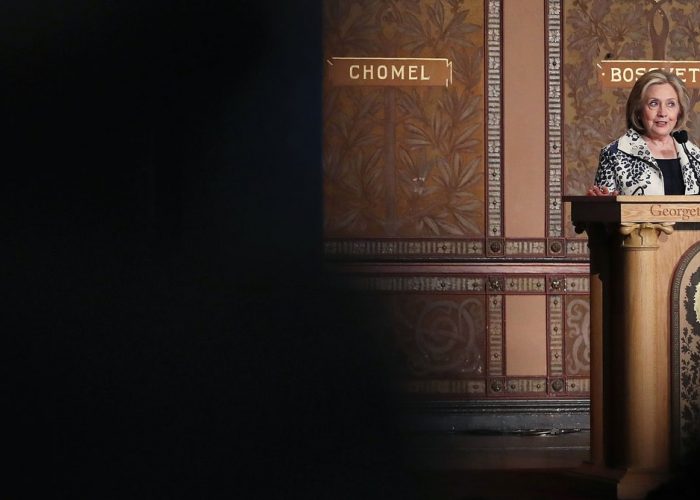Of all the bits of sleepover gossip ever uttered, this was the most unexpected. Basically, Hillary Clinton sex traffics children and sacrifices them to Satan or something, said my friend Beth, straightfaced. Its called Pizzagate, or whatever. It was a Friday night a few weeks ago and even though it was a typical girls-night-in, it was not a typical conversationbut I took the bait. Its called Pizza what? I asked, totally unsure of what I was getting myself into. Dude, you havent heard? Hillary and that one guy, John something? Podesta? Theyre involved in this massive underground sex trafficking operation, I saw it on TikTok. Its everywhere. Half convinced she was kidding, I asked if she actually believed something so obviously ridiculous. I swear, its legit, Beth replied. Theres been like five videos talking about it in a row. Its clearly not a coincidence.
At the completion of Beths ode to Pizzagate, I stared at her, eyebrows raised, mouth open. Taking note of my expression, she rolled her eyes. Then I did too. But for the rest of the night, I watched my two best friends gush over the medley of conspiracy theories that had been flickering across their TikTok For You pages and Twitter feeds, listening to them debate over which celebrity had exploited the most children and who had sacrificed who to what Hollywood god. As the conversation intensified and the lack of actual evidence became more and more obvious, I was overwhelmed by a wave of hysteria. It all seemed so ridiculous. How could these seemingly well-educated teenagersrising high school seniors, evenbe gullible enough to take a 60-second social media video for the truth? Conspiracy theories always seemed so juvenile to me. I knew better. Others, it seemed, did not.
Theyre not alone. Conspiracies theories are finding a whole new generation of acolytes amongst the teens of TikTok, whereaccording to a recent New York Times report#Pizzagate posts have been viewed more than 82 million times in the past few months. This became more obvious as the sleepovers conversation wore on. Honorable mentions of the evening: the (false) claim that home furnishings company Wayfair is involved in a sex-trafficking operation, the (also false) notion that Oprah Winfrey is involved in a similar plot, andmy personal favoritethat one-time pop-punk princess Avril Lavigne has been replaced by a lookalike. (This is, of course, also not true.) Yet, as the night continued it became obvious the people in my friend circle would be willing to bet their life savings, albeit minimal, on the idea that Ellen DeGeneres coerced Oprah into recruiting children for human trafficking after watching a young girl rant through a 30-second clip. The reason for their faith? The girl had made a PowerPoint, and even animated the transitions.
On the surface, it makes sense that young people would latch on to conspiracy theories on TikTok. The platform skews youngreportedly one-third of its daily users in the US are 14 or youngerand celebrity gossip has long been the lingua franca of social media for people of all ages. Right-wing conspiracy groups like QAnon have been spreading made up stories about those in power on networks like Facebook for years. Now those ideas have jumped to TikTok where theyre being metabolized by much younger consumers. Those things all scan. What doesnt, however, is why teens believe them.
Sofia Barnett is a 17-year-old writer living in Frisco, Texas. Currently a high school senior, she plans to attend college next year and eventually pursue a career in journalism or politics. Despite trying to convince her friends to stay off of social media, she spends approximately 10 hours per week on TikTok.
The short answer? TikTok is full of crazy ideasconspiracies are no different. They’ve been normalized by the platform where many young people spend most of their time. Many of these conspiracy sites and stories are entertaining. They are social gathering spots. They are exciting, says Nancy Rosenblum, Senator Joseph S. Clark Professor of Ethics in Politics and Government at Harvard University and co-author of A Lot of People Are Saying: The New Conspiracism and the Assault on Democracy. Its small wonder that teenagers who live on the screen would be drawn to the drama.
Easy access to social medias redistribution tools worsens this problem. With every like, share, send, and retweet, teenagers are popularizing this content worldwide. On social media, repetition substitutes for validation, says Russel Muirhead, a professor of democracy and politics at Dartmouth College and Rosenblums co-author. Repetition is what breathes air into conspiracy theories, and social media is all about repetition. But repeating something thats false does not make it more true! Teenagers are just as vulnerable to this as grown ups.read more
Why Teens Are Falling for TikTok Conspiracy Theories


